Donna’s laugh is infectious. A big hearty chuckle with a slightly raspy throat to follow, a bit like Sid James in the old Carry On films. Our conversation is peppered with laughter, hers and mine. While this wouldn’t be worthy of comment if we were discussing the weather or how our football teams were doing, when we’re talking about something so gut-wrenchingly hard as how she will survive the winter, it becomes dissonant. Why is she so cheerful, I ask her at one point. “You’ve got to be,” she tells me. “Otherwise you’d cry.”
A slight woman of 41, Donna is wearing a puffer jacket, zipped up to the collar, jeans and trainers. I’m introduced to her by Helen Eadon, the manager and founder of The Link, a charity shop and community hub in Stradbroke. Helen thinks she might be able to give me a sense of the kind of problems people in the area are currently facing. It turns out she’s right. As we laugh and talk, Donna reveals she’s currently living on emergency food parcels given to her by a foodbank at Grace Church in nearby Handsworth. She’s also pregnant, although you can’t tell yet under her thick coat. Then, just a few days ago, she was hit with a £500 energy bill from Eon.
We’re sitting in the weak October sun outside the shop, at a table which is used to display food for people to take for free. When we start talking there’s only one bag of wonky potatoes and two pears left on it. By the time we’ve finished, only the pears remain. “I can’t pay it,” Donna tells me, talking about the Eon bill. She’s going back to Grace Church tomorrow so she can speak to someone from Citizens’ Advice about a way of getting out of it. The cost of the bill is £150 more than she gets in Universal Credit a month.
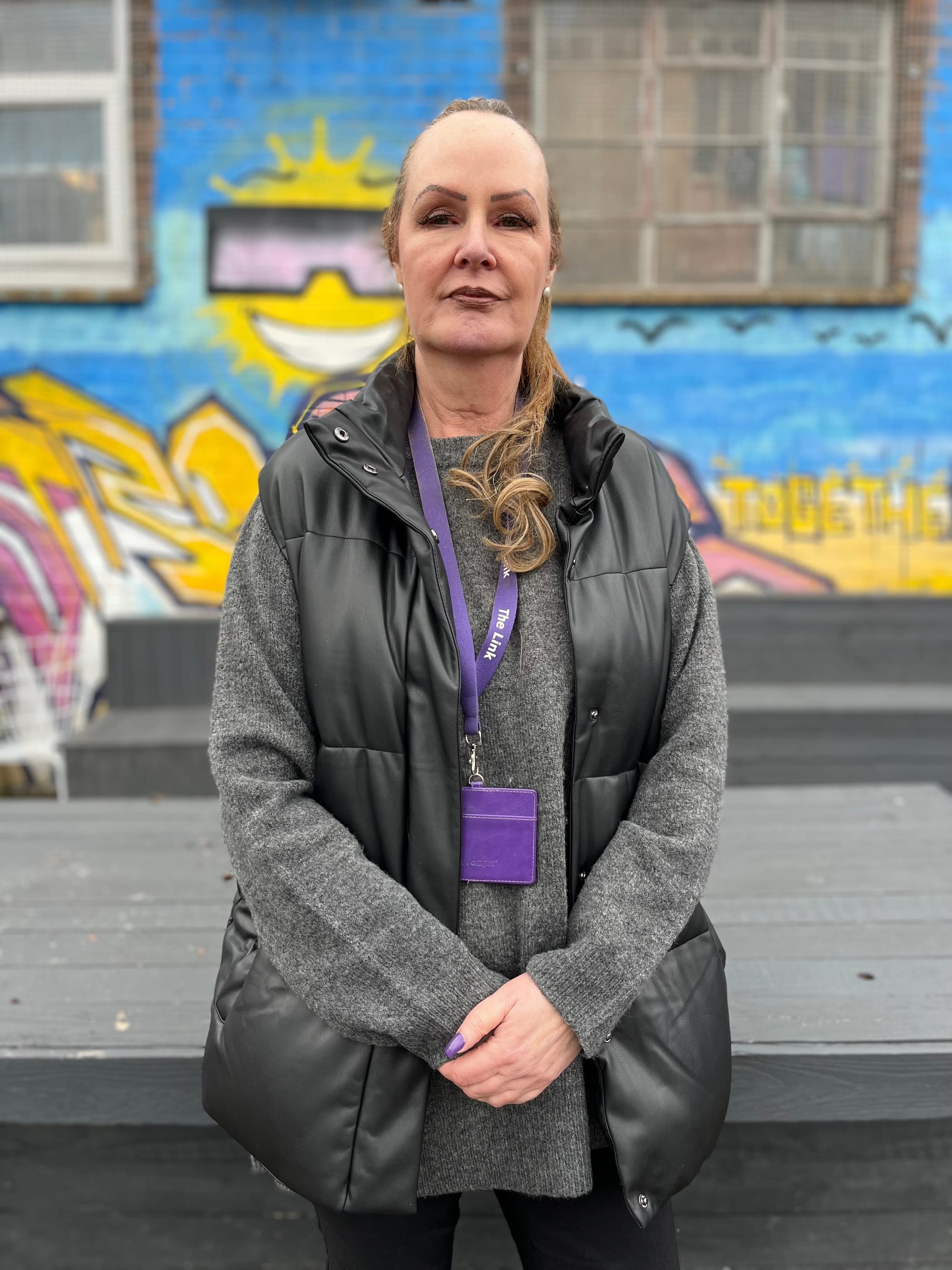
When there’s a choice between what to spend her money on, how does she decide, I ask. “I’ve got to eat at the end of the day,” she tells me. “I’ve got a baby inside me and I’ve got to keep her healthy. So I wrap up with a quilt instead of putting the heating on. I need to make sure I’ve got enough food to survive. Places like this are a proper godsend.”
Originally from the Wybourn estate, Donna was put in temporary accommodation by the council in Westfield after having problems with her former partner. She got her own place in Stradbroke in February this year but hasn’t really settled. Being surrounded by people who have their own struggles isn’t really good for someone in her condition. She tells me just the previous night the police were out at 3am dealing with a disturbance in the neighbouring flat. “Someone was smashing up one of the other blocks but after they’d left it just carried on,” she tells me. “I just don’t need it at the moment.”
A few hours earlier I’d arrived to talk to Helen about the cost-of-living crisis. Stradbroke isn’t exactly the first place I would have thought of when looking into the problems of deprivation in Sheffield. I’ve never been here before and to be honest, driving onto the small estate in the south-east of the city, my initial impression is positive. The leaves of the tall trees which line the neighbourhood’s streets are turning their pretty autumn colours and several houses have cartoon pumpkins and spindly-legged spiders ready for Halloween.
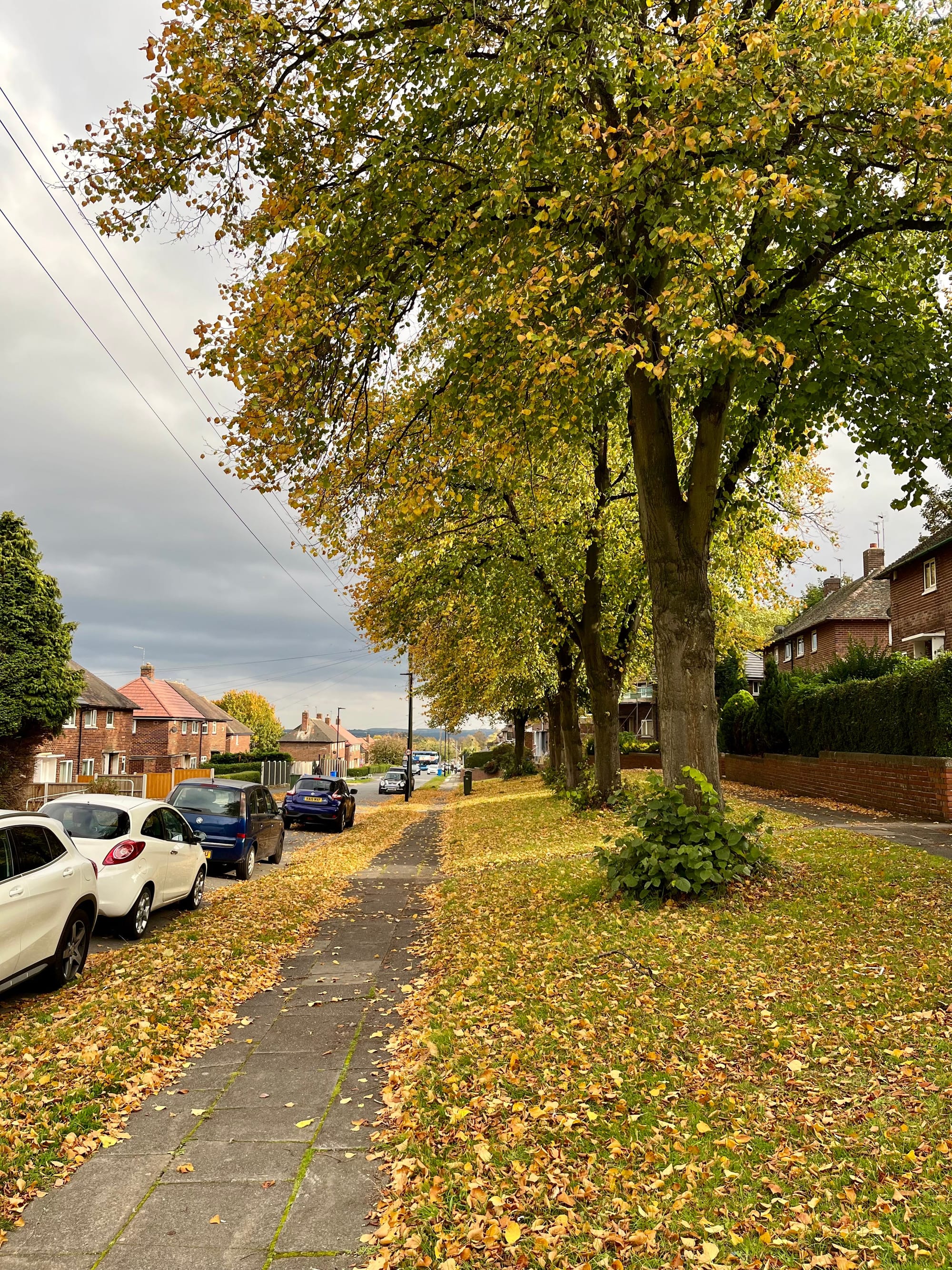
However, just from a quick wander around, it's clear that the area is deeply divided. Many houses further onto the estate are well-presented, with beautifully kept gardens, picket fences and gated drives. Around here, the streets there are quiet, with only the occasional barking of a dog breaking the silence. But in other parts of the estate, things look and feel different. Many of the remaining 800 council properties here are one-bedroom flats, which used to be lived in by little old ladies or gentlemen, but which are now home to younger single people, some of whom have problems including drug and alcohol dependency and mental health issues. In these parts of the estate, the neighbourhood feels unloved and intimidating, with boarded up windows and doors pockmarking the building’s facades. Helen tells me that it’s in these blocks that The Link’s most desperate customers, like Donna, usually live.
When The Tribune first covered the cost of living crisis earlier this year, I visited the Lowedges estate in the far south of the city, somewhere I knew would be feeling the pinch. Back then energy bills were just about to skyrocket, and I found a community fearful of what the next few months would bring. Fast forward to October and energy bills have just gone up again (not as much as feared due to the government’s intervention but still way more than many people can afford). But going into the winter months with a cost of living crisis driven by energy costs is a very different proposition to one coming into spring.
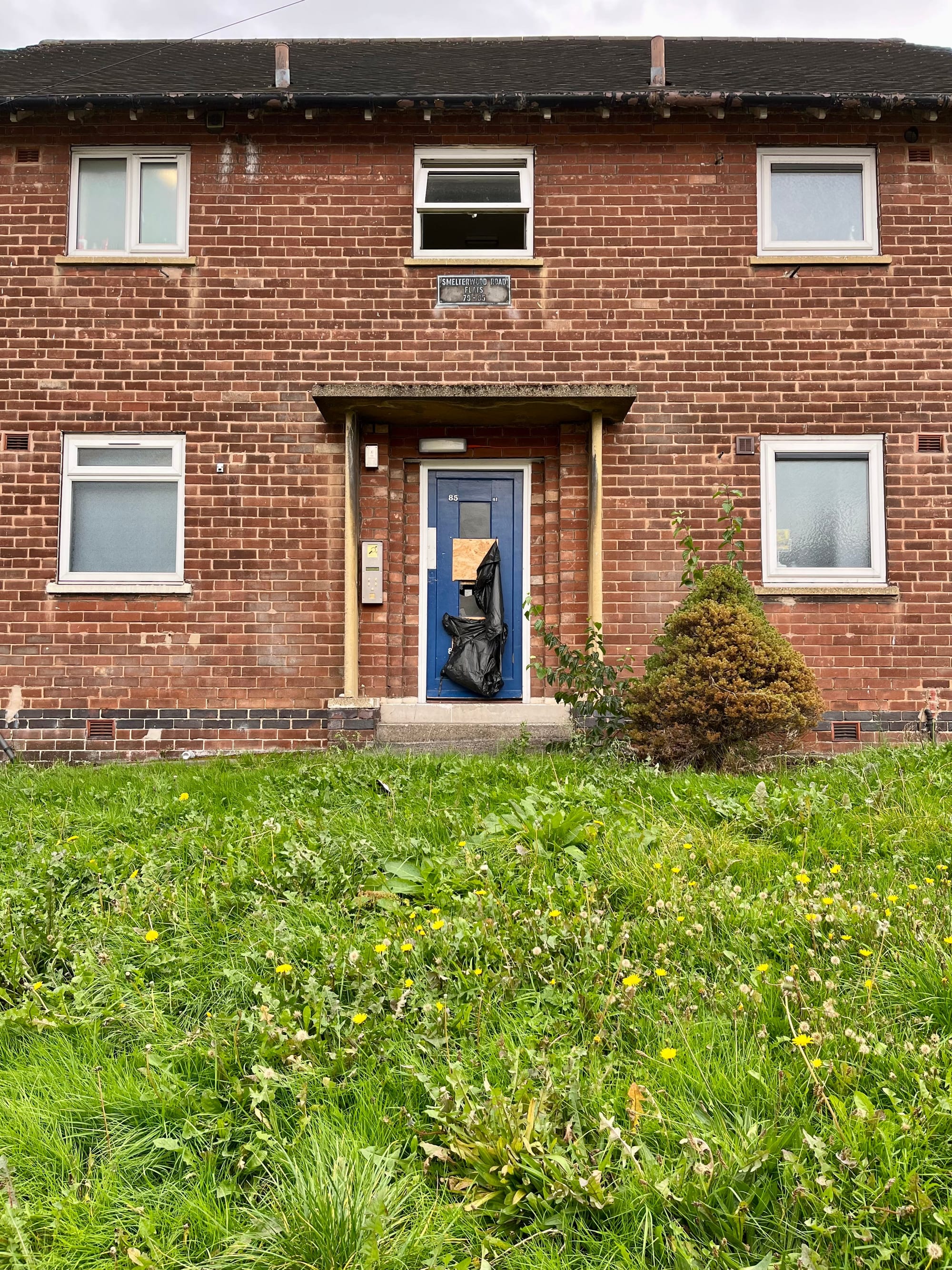
Wandering around the Smelter Wood Road flats it’s not difficult to find people worried about what the future might bring. On her way home from the convenience store I meet 22-year-old Kayla. She moved into the flats from living with her mum in Hackenthorpe but has recently considered moving back home. She works two jobs, one as a support worker and the other as a cleaner, and gets paid just £1,100 a month — out of which immediately comes rent of £400, council tax of £120 and £80 to get to work on the bus. “By the time I’ve paid my phone bill I literally have nothing left,” she tells me. “The cleaning job is cash in hand. If I didn’t have that I genuinely don’t know how I’d survive.” The fact that her boiler is currently on the blink and burns through £20 every 12 hours is only adding to her worries.
And on his way back home from his mate’s house is Ian, 48. He’s currently training to work in the railway industry, and has only the £200 he gets from Universal Credit every month to live on. “I can’t put the heating on anymore,” he tells me. “I put my last three quid in earlier this week and that lasted me about five minutes.” He says he’s just been to see a friend who lives nearby so he can stay warm for a bit, but he can’t do that forever. Other than that he’s just waiting on the next cost of living payment, but that isn’t going to come until November. “Everybody is in the same boat and just trying to get by but it’s fucking shit,” he tells me. “It’s ruthless.”
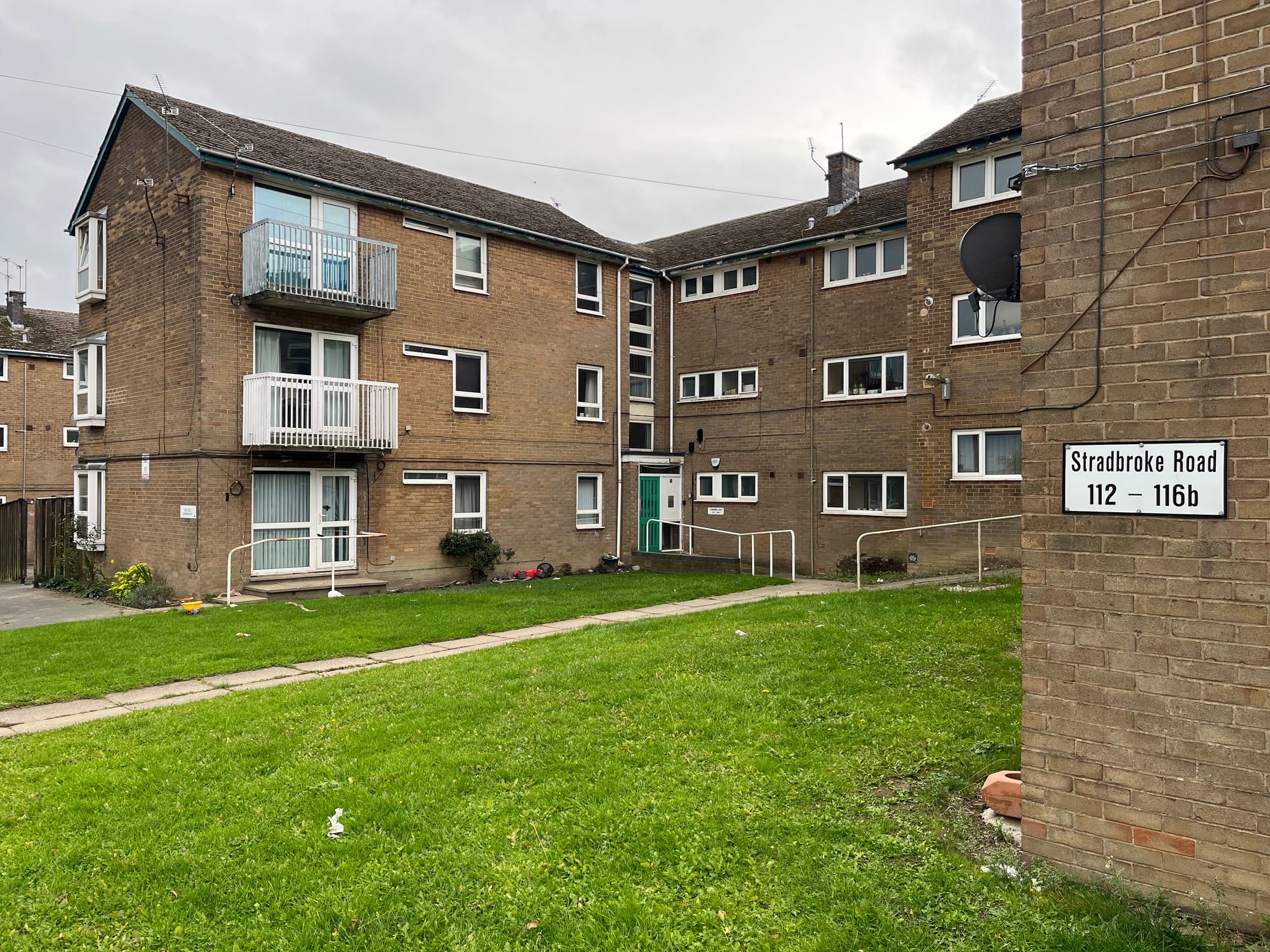
I don’t ask either of them if they use The Link, but many people around here do. It’s located on the central parade of shops which form the focal point of the estate. The shop is like an Aladdin’s cave of anything and everything you could ever want, from racks and racks of clothes to shelves full of homeware, toys and novelty plant pots. A mannequin with a glittery wig stands sentry in the middle of the room. Outside, as well as the table with free produce, there are also board games, baskets of DVDs and trays of Christmas decorations.
When I arrive it’s already busy — and it stays that way the entire time I’m there. A steady stream of people peruse the shelves and racks. Some customers chat and laugh with the busy volunteers, leaving with armfuls of clothes. But others are less pleased to be there. In the first 10 minutes of me being there two agitated-looking young men come in to collect food parcels which Helen and her team have prepared for them. “Me benefits have just been stopped,” says one as he bundles through the door, his embarrassed face turned to the ground rather than looking people in the eye. “Thank you so much.”
The volunteers tell me five or six people come in every day to pick up food parcels, which contain staples like bread, pasta, tins of beans and soup and long-life milk. They also put in toiletries when they have them and have separate parcels for people who need items like nappies, sanitary products or pet food. “Very often when they come they say they feel ashamed,” says Helen. “There is still a big stigma about asking for help.” Helen tells me some people put off asking for help because they’re worried it will reflect badly on their parenting and attract the attention of social services.

Speaking over a coffee in The Cabin, an upcycled shipping container at the back of their Stradbroke Drive base, Helen tells me about the problems many people on the estate face. As well as picking up cheap clothes and household items, and collecting food parcels, many people come to The Link just to use the phone. You can’t walk into the local doctors anymore, so if people have no credit on their phone, they have no way of making an appointment. Ditto for calls to the job centre, meaning they can get their benefits reduced or stopped if for any reason they can’t turn up.
Things have got much worse in the last six months, but the poverty they’re seeing hasn’t come out of nowhere. “People around here have not just started struggling,” she tells me. “This has just highlighted it.” She says she knows of customers who scavenge in the bins around the back of the local Co-op. The situation for many is now so bad that loan sharks are operating again on the estate, threatening violence to those who can’t pay their debts.
Giving someone access to a phone for a couple of minutes is a fairly easy thing to do. But if they can’t afford to top up their electricity card, or pay their gas bill, it gets more difficult. Since the cost of living crisis began to really bite earlier this year, Helen has seen a huge increase in the number of people not being able to heat or power their home or do simple things like have a shower. That was in the summer. With the winter months approaching, Helen says people have started getting really scared about what might happen. “They began saying if it stays like this we won’t survive this winter,” she tells me.
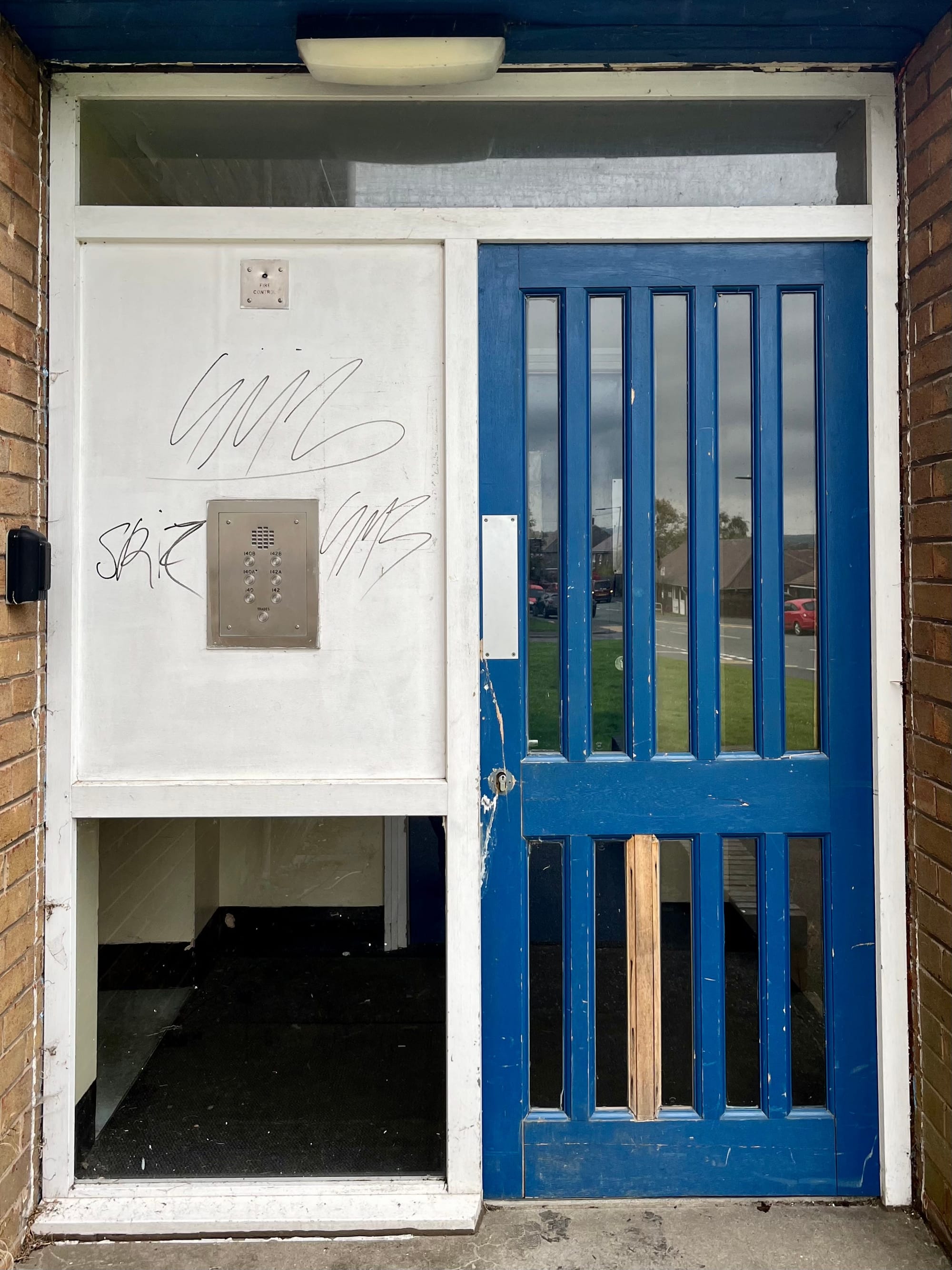
In the face of this urgent need, Helen asked the council for help. Due to open in the next few weeks is The Space, a one-bedroom flat just over the road from the shop — given to the Link by the council, permanently and absolutely free. The “community flat” will be a place people can be referred to for free to get warm, wash their clothes, use the phone line and internet connection and have a shower. Staff will be on site to help at all times, but Helen knows that every day there will come a point where they have to send people back to their cold and dark flats. They plan to give them hot water bottles and flasks to tide them over until they open again the next day.
Helen gave an impassioned speech about the flat at a meeting of the council at Sheffield Town Hall in September. “It proves what a community can do,” she was reported as saying in The Star. “It’s sad that we need it, but this could be replicated in every little community.” Earlier this week Councillor Mazher Iqbal told the local democracy reporting service that the council was about to roll out a series of “welcoming places” in neighbourhoods across Sheffield where people can drop in, have a hot drink and take part in activities during the day without having the cost of putting on their heating.
When I speak to Helen about Donna, she says of all the people she deals with, her case isn’t actually that extreme. She’s worried about what the next few months could bring for Stradbroke, and says she thinks the next year could be worse than Covid for many people on the estate. But even when the cost of living crisis finally abates, the problems of her customers won’t go away. “Most people haven’t got a clue how bad poverty is in this country,” she tells me. “They need to spend a day here and find out what it’s really like.”
Comments
How to comment:
If you are already a member,
click here to sign in
and leave a comment.
If you aren't a member,
sign up here
to be able to leave a comment.
To add your photo, click here to create a profile on Gravatar.







